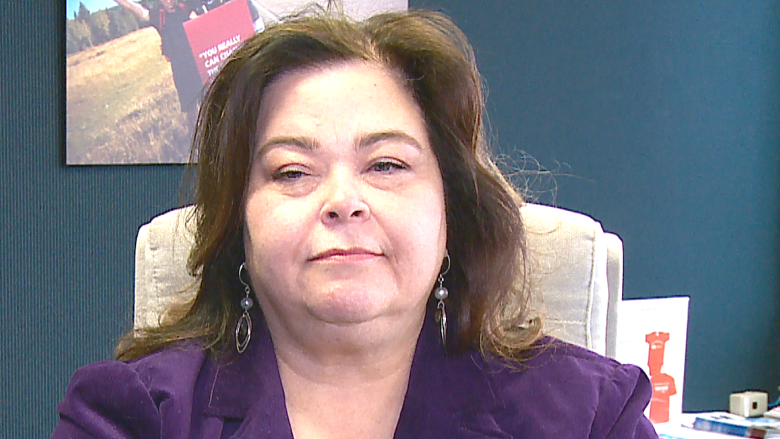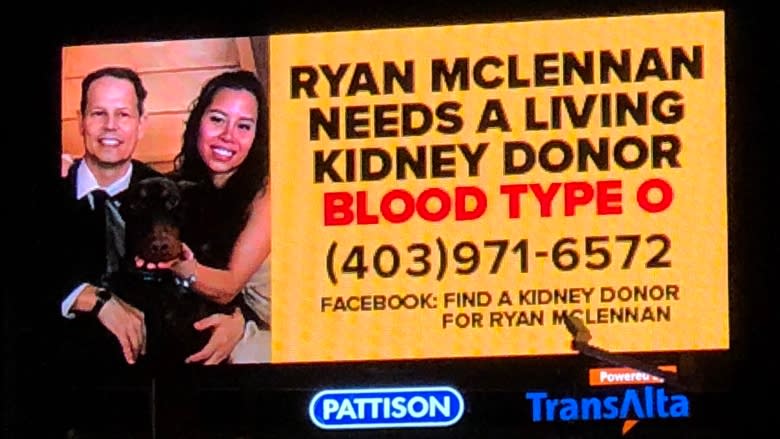Kidney Foundation gets dozens of calls in response to family's plea for organ donors
The head of the Kidney Foundation in Calgary says the family that put up billboards seeking donors is helping everyone waiting for transplant.
"It always brings more living donors into the system, not just for the person who's put the word out, but there will be others that will benefit from these stories, for sure," said Joyce Van Deurzen, executive director of the Kidney Foundation of Canada in southern Alberta and Saskatchewan.
Dozens of calls
She says her organization and the living donor program at the Foothills Hospital have received dozens of calls in response to the campaign.
Ryan Mclennan's family put up 27 billboards in and around Calgary, pleading for living donors with Type O blood.
They say his kidney is functioning at four per cent, putting him in the end-stages of renal failure, so they're aggressively trying to find help.
While people with Type O blood are often referred to as "universal donors" — meaning they can donate to any blood type — they can only receive organs from other people with Type O blood, making their odds of getting a kidney very low.
Only a few dozen people receive kidney transplants in southern Alberta each year, and the majority come from living donors.
If a donor comes forward, they can't donate directly to Mclennan but can instead independently join Canada's kidney paired donor program.
The hope is that if enough people join the program that are a match, Mclennan stands a better chance of receiving a kidney.
The program is filled with donors and patients who need kidneys, who aren't compatible matches. Three times a year (in February, June and October) a computer algorithm creates as many matched pairs of kidney donors and recipients as possible — meaning that if a donor joins the program without someone they hope to donate to, they could kick off a chain, leading to as many as six people receiving kidneys.
'It raises awareness in general'
Lauren Herschel donated her kidney to a stranger in 2011 and agrees the billboards ultimately help, despite some reservations.
"There has to be some checks and balances in place and you have to make sure money's not exchanging hands and all that stuff. But I think it's good because ultimately it raises awareness in general that people can do this," she said.
Herschel says if Mclennan gets a match through his public plea, it can help another donor as well, by taking him off the list and bumping someone else up.
"In a sense, him looking for a kidney almost helps two people," she said.
Donated kidneys last up to 20 years
Not everyone feels that way, however.
"I very much want my daughter to get a transplant, too, but we understand that there's a queue and we've been in the queue, she's been on dialysis now for two years," said Brian Zytaruk about his daughter.
He donated his kidney to her in 1988, but the organ has worn out. A donated kidney lasts 15 to 20 years on average, according to the Kidney Foundation.
"It's tough to go through these things, but we're hoping in the next few years she'll get another kidney."
Van Deurzen recommends being more aggressive.
"Anyone has the opportunity to promote their need for an organ and to put their message out there," she said. "We encourage that. That's a good use of social media, advertising and it just amplifies the conversation."
The living donor program says those interested in learning more about becoming a living kidney donor can call 403-944-4635.
- MORE ALBERTA NEWS | Stéphane Parent's next court date set for March in cold-case death of Adrienne McColl
- MORE ALBERTA NEWS | Trade fine small compared to billions lost if Trans Mountain doesn't go ahead, minister says



